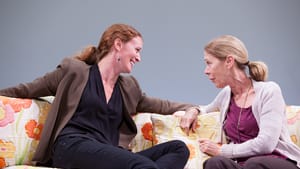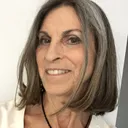Stay in the Loop
BSR publishes on a weekly schedule, with an email newsletter every Wednesday and Thursday morning. There’s no paywall, and subscribing is always free.
Feminism on the rocks
'Rapture, Blister, Burn' at the Wilma

Rapture, Blister, Burn, the new play by Gina Gionfriddo now showing at the Wilma Theater, is set at Home. The large word on the wall behind the actors tells us where we are. We bring our own connotations about what Home means, but the reality is that no one is at home in the world of this play. The characters pretend they are where they’re supposed to be, but in fact they are each longing for something else.
Gionfriddo, a Guggenheim Fellowship and Susan Smith Blackburn Prize winner, has written a play that explores feminism and its consequences. It’s not a comfortable play for a feminist, since one of Gionfriddo’s points is that Phyllis Schlafly, the anti-feminist, may be right when she says that women who choose to act like men pay a price. But what is the alternative, I wonder. Am I really supposed to take on the gender roles of the past just to have a man? Is that even what I want?
To give some personal background: I came to feminism late. I was smart and successful and independent and already in law school in the 1970s when I first realized that was unusual. Most women weren't doing what I was doing. When the shootings at Kent State happened, we went on strike, and politics and life were no longer separate. In August of that year, I walked out of work and went to Union Square and joined the Women’s Strike for Equality. That was when I began to understand that many of my life experiences had been determined by gender. I didn't need a theory to tell me what was wrong; I was living the problem, and I was one of the lucky ones. So when I see a play about the thing that changed so many lives, I want it to get at the heart of the choices we made and continue to make.
Having it all, or not
This play doesn’t give us easy answers. Catherine, played convincingly by Krista Apple-Hodge, is a rock star professor who has written successful books on porn and torture — topics a nice girl wouldn’t touch — and even appeared on Bill Maher. Returning home to take care of her mother Alice (Nancy Boykin), who has just suffered a heart attack, Catherine has come back not only to the place she grew up and left behind, but to her old grad-school boyfriend Don (Harry Smith) and his grad-school-drop-out, stay-at-home wife Gwen (Maia DeSanti).
Catherine teaches a seminar on the Fall of American Civilization, covering topics like torture-horror and slasher films as signifiers of women’s threat to the social order, and we, as well as the other characters, are her students. She asks questions and lectures, and I think I ought to be taking notes. I know this material because I lived through it, but I haven’t studied it. I don’t know who said what when. And I’m not sure I care. Is feminism an academic subject or a lived experience?
The question I found myself asking was, “Why can’t successful women ever be happy?” Catherine’s world crumbles before our eyes, her stand on feminism fades in the presence of what might have been — and, of course, what might have been is a man and children and opportunities missed.
Is this all really about the impending loss of her mother, or is it more? Didn’t Schlafly say you can’t have it all? Is that what Gionfriddo says as well?
Everyone in this play, it seems, is a loser. Catherine drinks too much and longs for a relationship. Her mother has her own regrets about a marriage that was convenient but not content; Don smokes pot and watches porn while his career dwindles; and Gwen, who cares for her husband and children, still longs for Catherine’s life. The only character who seems to have a future is Avery, the babysitter with a black eye, a sassy troubled student who possesses the wisdom her elders can’t quite grasp.
Choices and expectations
Elizabeth Gilbert (author of the syntactically similarly titled memoir Eat, Pray, Love) and Oprah had an interesting conversation on last week’s Super Soul Sunday, about choices women make about not mothering and not succumbing to expectations. I wanted to recommend that Catherine watch the show and rethink her priorities.
While the topic is challenging, this is feminism that can laugh at itself — lots of zingy one-liners keep us amused, even if I did find myself wondering what the audience was actually laughing at. Uncomfortable truths are not laugh-out-loud funny — they evoke more of a wry smile of recognition. The show takes potshots at reality TV, porn, Dr. Phil, gender expectations, and motherhood. The old saw that if you can get the milk for free why buy the cow is updated to “if you can get directions from Google, it becomes a hassle to unfold a map.”
The acting is good, the set minimal but effective. It’s a play that forces you to think about choices made at the same time that it makes you laugh. Set it to music and maybe you have 9 to 5, currently finishing its run at the Walnut Street Theatre, a play about women navigating the choices between having a man and having a career. Only the women in 9 to 5 weren’t worrying about consequences; they just wanted to change the world.
There is a lot of discussion in this play. It is driven by ideas rather than plot, which is daunting for both audience and actors. But what, I wondered, as the play came to an end with everyone slightly dissatisfied, had I just seen? Was it a call to a new world order or a reminder that the more things change, the more they don’t? I’m hoping, that like the slasher films discussed in the play, it’s a reminder that the “final girl,” the one who survives, fights on for what she wants.
What, When, Where
Rapture, Blister, Burn, By Gina Gionfriddo, Joanna Settle directed. Through November 8, 2014 at the Wilma Theater, 265 S. Broad St., Philadelphia. 215-546-7824 or www.wilmatheater.org.
Sign up for our newsletter
All of the week's new articles, all in one place. Sign up for the free weekly BSR newsletters, and don't miss a conversation.
 Naomi Orwin
Naomi Orwin